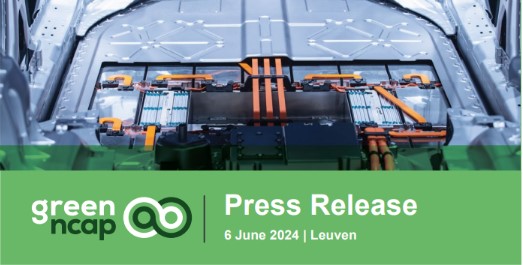

Today, Green NCAP releases results for the Honda CR-V and the FIAT Doblo, and further information on the recent tests of the ZEEKR 001 and the ZEEKR X.
At the front of this month’s results is the Comfortable Runabout Vehicle or the Honda CR-V. First manufactured by Honda in 1995, the car has remained steadfastly part of the auto market ever since. Six generations later, it remains a valuable and appreciated car for many families and offers a variety of powertrains. We tested the e:HEV version. Green NCAP’s Clean Air assessment is where the Honda CR V performs best, achieving 7.3 out of 10 points and demonstrating adequate and robust control of gaseous pollutants. However, as a heavy SUV (Sports Utility Vehicle), this takes its toll on the car’s petrol consumption figures. The value of 9.8 l/100km in highway testing costs the Honda many points in energy efficiency. The Honda CR-V achieves an overall score of 44% and 2.5 Green Stars.
The FIAT Doblo, a car designed on a van, was first launched by FIAT in October 2000. It has remained a consistent choice for consumers for its positive van attributes, such as its high seating position, spacious interior and ample passenger capacity. We tested the FIAT Doblo Combi 1.5 Blue HDi diesel FWD manual. Like other fossil-fuelled cars, it struggles most with greenhouse gas emissions, namely CO2, which is compounded by the relatively high consumption figures of this small van. More positively, exhaust pollutant emissions are managed impressively and, like the CR-V, are kept far below legal limits and Green NCAP thresholds. Further improvement of cold start emissions control could help the FIAT achieve an even higher score than the current 8.6 out of 10. The FIAT Doblo delivers an overall score of 42% and 2.5 Green Stars.
In real contrast to these two traditional market players, Green NCAP recently tested two new market entrants: ZEEKRs 001 and X. ZEEKR, a company founded in March 2021 by Chinese carmaker Geely as a premium electric mobility brand for battery-powered vehicles, has its sights firmly set on the more innovative end of the car market. In its short life, ZEEKR has joined forces with both Waymo and Mobileye in developing autonomous vehicles. In part due to their electric powertrains, the 001 and the X both reveal impressive performances in Green NCAP’s stringent testing.
Green NCAP tested the long-range rear-wheel drive version of the ZEEKR 001 hatchback. It has a usable battery capacity of 96 kW and offers consumers an average range of 529 km, as measured by Green NCAP. This increases on short urban trips to 676 km and decreases to 336 km in very cold temperatures. In the battery capacity test, the electric energy of 110.7 kWh needed for a full battery recharge and the measured usable battery energy of 99 kWh gives the vehicle a creditable grid-to-battery output efficiency of 89.4%. The ZEEKR 001 achieves an impressive overall score of 95% and 5 Green Stars.
The ZEEKR X is an urban premium SUV with an appealing design that offers a luxurious driving experience. Green NCAP tested the long-range, rear-wheel drive version of the ZEEKR X with a 65-kWh declared usable battery capacity and a Green-NCAP-estimated range of 353 km. In highway driving, this range decreases to 280 km and to about 250 km in the -7°C Cold Ambient Test. Green NCAP’s battery capacity test revealed a usable capacity of 66.4 kWh, slightly more than ZEEKR’s claimed figure. The ZEEKR X achieves an impressive overall score of 96% and 5 Green Stars.
“Hybrids are a viable alternative for consumers looking to reduce their carbon footprint. However, Green NCAP’s experience shows that under motorway conditions these powertrains help only moderately to deliver driving economy, particularly in the case of a heavier and larger vehicle such as an SUV. Both tested vehicles – petrol and diesel – had very low pollutant emissions, proof of good working modern exhaust aftertreatment. In general, diesel cars can offer a good economy, but the challenge comes with greenhouse gas emissions released by the combustion of fossil fuel. And with electric-powered cars, consumers should be aware that consumption on the highway, especially under cold weather conditions might be significantly higher.” – Dr. Aleksandar Damyanov, Green NCAP’s Technical Manager
For full results, visit www.greenncap.com.
For media information, please contact Cordelia Wilson at media@greenncap.com